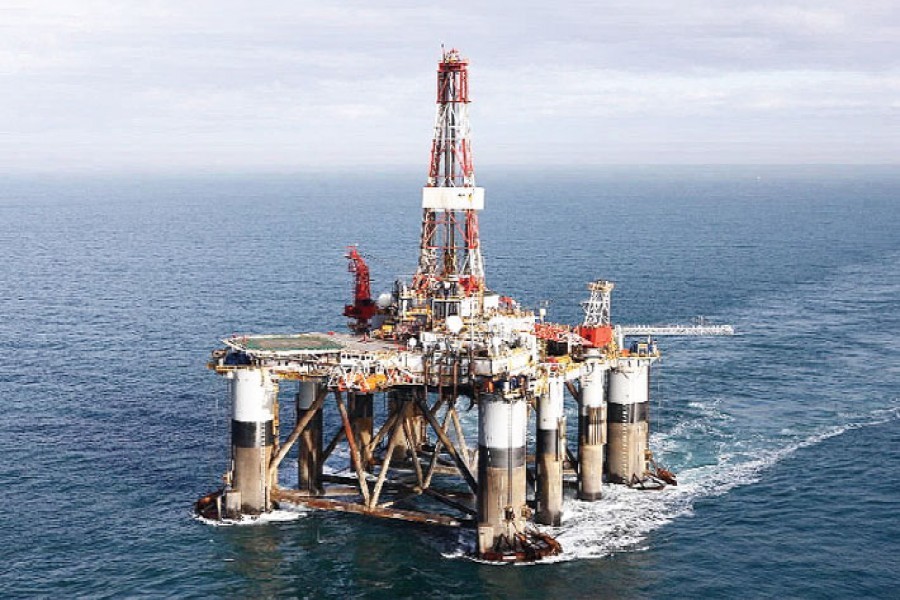
Published :
Updated :

It would appear that the extreme hardship the people endured and the crunch economy experienced this year due to blackouts hardly become priority issues for the policymakers to address. Over the many months past, there was a glimmer of hope that the country was finally going to expedite the bidding process for offshore blocks, but suddenly all bets seem to be off. According to a report published in this newspaper, "launching long-awaited bidding for offshore hydrocarbon exploration seems uncertain before the next general election, slated for January 2024, sources said, while the country's fuel-import dependence increases."
Reportedly, there are 26 open offshore blocks. Of these, 15 are in deep waters while the rest 11 are in shallow waters. Bangladesh won its maritime legal battle back in 2014, but due to the foot dragging (for inexplicable reasons) on conducting a seismic survey year after year paved the way for an ever-increasing import-dependent policy on fuels. Today, nearly 60 per cent of the energy mix comes from imported fossil fuels, a policy that defies logic since the country is paying out billions of dollars in payments.
Petrobangla chairman recently stated that the country has completed a 2D (two-dimensional) seismic survey of about 13,000 square kilometers at sea. On top of this, the production sharing contract (PSC) has recently been redone which allows the gas price from offshore drilling to be fixed in line with the international market. Hence, another major complaint regarding favourable terms has also been addressed. Still, Bangladesh continues to suffer from dollar hemorrhaging and is not serious about going for bidding to award contracts for desperately needed hydrocarbons.
The latest PSC gives Bangladesh 65 per cent profit, which may drop to 35 per cent. The older PSC model was much more complicated when it came to profit sharing, but could potentially give the country as much as 80 per cent of the profit. Thankfully, the model has been reshaped to reflect the realities, which basically is a situation where the nation is energy-starved. With pricing of gas set at 10 per cent of three-month average of Brent crude price barrel, this is something international oil companies can live with. The new PSC also allows for greater participation of world class exploration companies to get involved.
Some policymakers probably feel that the country should wait till 2024, i.e., until the rest of the multiclient survey is finished before opening bids for offshore exploration. Perhaps it has something to do with the fast-depleting foreign exchange reserve. Alternatively, it may be that the import lobby involved in the import of various hydro carbons, like liquefied natural gas (LNG) or other fuels that power the private sector power generation plants have too much sway on the decision-making process.
Should the government decide to delay the offshore search for hydrocarbons, what is stopping it from engaging in joint ventures with foreign companies onshore? Energy experts all agree that current natural gas production from existing fields is falling, resulting in both a deficit in supply and an increase in cost of electricity generation (as the country leans more towards imported fuels). The periodic raising of gas tariff can only offset part of the cost and subsidies continue to plague government financing.
The facts speak for themselves. Over the period 2017-2023, daily gas production has declined by 500-550 million cubic feet per day (MMCFD). Today, daily gas production stands around 2,250 MMCFD and steps need to be taken today if Bangladesh is keen to arrest this downward trend. Indeed, major gas fields like Bibiyana, Moulivibazar, Jalalabad and Titas Gas field are beginning to show signs of faster depletion from the various wells. To offset this, new development wells have to be developed. Additionally, there is no alternative to new exploration. Domestic state-owned companies have failed to deliver any major gas finds for a decade now.
The current manner in which bidding is done for onshore exploration is extremely lengthy and cumbersome. According to a former director of Petrobangla, if Bangladesh can have a Special Act for procuring energy, why can't there be such an Act for drilling operations? Without access to primary energy, no electricity can be produced. If a law was in place, then some experts believe that it would be possible to award bids in as short as four months' time. The basic reality is that the country is out of time when it comes to energy supplies. Already, the country is in deep trouble with its balance of payments. Back in July, a major international oil company wanted dues of US$280 million. Similarly, the government owes hundreds of millions of dollars to international suppliers of energy (and electricity) and it is in a bind because non-payment means no supply - an unthinkable proposition for the economy. Speedy exploration of own resources is the only solution left and hopefully, such utopian ideas about waiting till the election is complete should be shelved.
mansur.thefinancialexpress@gmail.com


 For all latest news, follow The Financial Express Google News channel.
For all latest news, follow The Financial Express Google News channel.